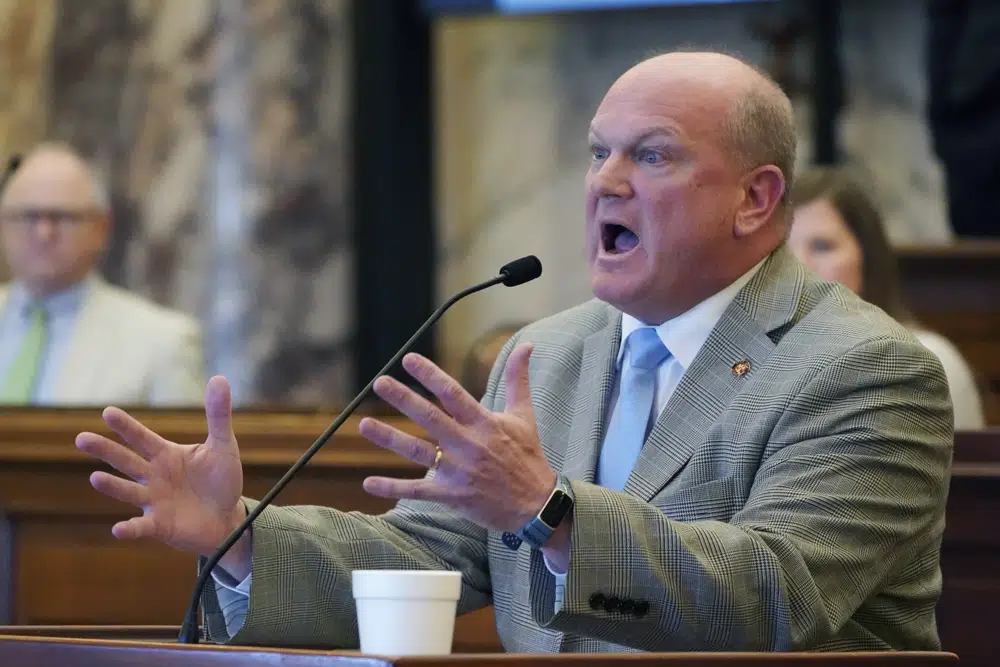Mississippi marijuana dispensary owner sues state over advertising ban

By Steve Wilson | The Center Square A Mississippi medical marijuana dispensary owner is suing the state over its prohibition on advertising for his business and others like it. Clarence Cocroft, the owner of Tru Source Medical Cannabis in Olive Branch, filed the lawsuit on Tuesday with the help of the nonprofit Institute for Justice in the U.S. District Court for the Northern District of Mississippi. Cocroft’s complaint says state law and regulations approved by the Mississippi Board of Health, manager of the medical marijuana program, prohibit him from advertising his business, which is a violation of his First Amendment rights. The medical marijuana program was created by Senate Bill 2095 and signed into law by Gov. Tate Reeves in 2022 after the entire ballot initiative process was thrown out by the state Supreme Court. This decision struck down a ballot initiative that would’ve created a medical marijuana program much like in Oklahoma. The law puts restrictions “on the advertising, signage, and display of medical cannabis,” which the lawsuit says the state Department of Health enhanced with its regulations that prohibit advertising in any media, be it TV, newspapers, online via pop-up ads, or social media. The lawsuit says Cocroft is penalized because he had to change the location of his business in Olive Branch from a high-traffic area (due to a ban on a dispensary being 1,000 feet from a school, church, or daycare) to one without substantial vehicle or foot traffic in an industrial park. Cocroft says the original location wasn’t in violation of this requirement, but that the Health Department ruled against him. He also says in the lawsuit he budgeted $300,000 for advertising and bought four billboards in a highly trafficked area near casinos, but now has to rent them to other businesses due to the ban. A decision in the case could have consequences for other states as well. Bordering states with medical marijuana programs, such as Arkansas and Louisiana, have similar prohibitions for dispensaries. “The state government cannot simultaneously authorize the legal sale of a product or service, while forbidding the truthful advertising of said product,” attorney Katrin Marquez of the Institute for Justice said in a news release. “All Clarence wants to do is advise people that they might be eligible to legally purchase marijuana for the medical conditions they’re struggling with, so he can help his business succeed.” The lawsuit is seeking a judgment that would override the advertising ban and attorney fees. Republished with the permission of The Center Square.
Tornadoes clobber Mississippi. Hours later, its governor attends Republican fundraiser in Alabama

Mississippi Gov. Tate Reeves traveled to Alabama for a Republican fundraising event as people in his state were still reeling from back-to-back tornadoes that killed one person, injured dozens, and destroyed homes and businesses, and in the midst of lingering power outages from severe thunderstorms. Alabama Gov. Kay Ivey and Reeves headlined a Republican Governors Association fundraiser on Monday at the Grand Bohemian Hotel in Birmingham, according to an invitation obtained Tuesday by The Associated Press. Ticket prices ranged from $5,000 for one person to $50,000 for four people. Reeves is the policy chairperson for the RGA and is seeking a second term as governor this year. His campaign manager Elliott Husbands said in response to questions Tuesday that the event was planned long ago, and money raised there was not earmarked for any specific campaign. Kentucky, Louisiana, and Mississippi have the only governor’s races this year. Reeves has stayed in contact with Mississippi Emergency Management Agency leaders since storms started pounding the state last week, including during his Alabama trip that lasted about three hours, Husbands said. “The Governor also has personally communicated with local leaders in the affected areas,” Husbands said. “In addition, he has already said publicly he is going to be on the ground in the impacted areas tomorrow.” Brandon Presley, Mississippi’s northern district public service commissioner, is the Democratic nominee for governor. His campaign communications director, Michael Beyer, on Tuesday, criticized Reeves for attending the Republican Governors Association event. “It is no surprise to see Tate Reeves leave the state for a fundraiser in the middle of storm recovery — when given a choice between rubbing elbows with the wealthy and well-connected or speaking face-to-face with Mississippians who have had their lives upended by this storm, he will always go after the money,” Beyer said. “If it would mean furthering himself, Tate Reeves would go to Antarctica for a campaign check.” Reeves did not fly on the state airplane to the fundraiser, Husbands said. Thousands of people have been sweating without air-conditioning since severe thunderstorms knocked out electrical service last week in central Mississippi. A tornado that struck Jasper County in eastern Mississippi overnight Sunday to Monday killed one person, injured nearly two dozen people, and damaged more than 70 homes. Later Monday, another tornado struck coastal Jackson County. It injured six people and damaged about 100 structures. The city of Moss Point was hardest hit. Reeves said Tuesday on social media: “We’ll be here for the long haul to support these communities and help them recover.” Republished with the permission of The Associated Press.
Mississippi GOP governor and Democratic challenger Brandon Presley spar over crime, courts, and trans care

Mississippi Republican Gov. Tate Reeves and the Democrat who is trying to unseat him this year, Brandon Presley, traded barbs about crime, courts and transgender health care Friday in separate appearances before newspaper editors and publishers. Reeves, seeking a second term, said at the Mississippi Press Association convention that Presley has failed to answer questions about two bills that Reeves signed into law. One bans gender-affirming health care for transgender minors. The other expands the role of state police in Mississippi’s capital city and creates positions for some judges who are appointed in a state where most judges are elected. Reeves said people tell him they worry that “the lines between boys and girls are disappearing,” and he shares those concerns. “We signed bills in Mississippi to prevent children from getting life-altering, experimental procedures,” Reeves said. Reeves’ language echoes that of groups that oppose LGBTQ+ rights, including the Family Research Council, which has backed model legislation asserting “gender transition is an experiment.” Dr. Jack Drescher, a psychiatry professor at Columbia University who edited the section about gender dysphoria in the American Psychiatric Association’s diagnostic manual, has said that valid science supports gender-affirming care for transgender youths. “So far in Mississippi, my opponent — he won’t say a word,” Reeves said. “Y’all spilled a lot of ink over the legislation when I signed it.” Presley appeared about an hour after Reeves and responded to a question about banning gender-affirming health care for minors. “I trust families,” Presley said. “I trust mamas, I trust daddies, to deal with the health care of their children.” Presley, in his fourth term as Mississippi’s northern district public service commissioner, said Reeves talks about transgender issues as “a smokescreen” to distract from problems, including a multimillion-dollar welfare fraud scheme that developed while Reeves was lieutenant governor. “Before this campaign is over with, if it will hide his record on corruption … if it will hide the fact that hospitals are shutting down, he will say that Martians have landed in Montgomery County, to divert your attention,” Presley said. Reeves said Democrats passionately opposed expanding the role of state police in Jackson and creating positions for appointed judges. The NAACP filed a federal lawsuit arguing that Mississippi is creating “separate and unequal policing” in majority-Black Jackson compared to the rest of the state. The lawsuit is still pending. Leaders of the majority-white and Republican-controlled Legislature said the law is intended to reduce crime in Jackson, which has had more than 100 homicides in each of the past three years. The city has about 150,000 residents. “I sure think it’s a good thing to have more people working towards public safety in our state capital,” Reeves said. He said Presley is hoping to avoid questions about the law. “And he’s on his knees praying you won’t challenge him when the answer he gives is a whole bunch of nothing,” Reeves said. “Just talking points from out-of-state, left-wing consultants who have told him to shut up about anything that the voters care about and anything that is not a personal attack on me.” Presley said when he was mayor of the small town of Nettleton, he would not have wanted the Legislature to tell him how to run the police department. He also said he supports electing judges, not appointing them. “Obviously, there’s got to be an address to the crime issue in and around Jackson. I’m not oblivious to that,” Presley said. “But I can tell you this … you’re not going to solve that issue effectively without collaboration with local officials.” Presley also talked about his uncle, Lee County Sheriff Harold Ray Presley, who was killed in 2001. “I stood over the coffin of a loved one killed in the line of duty as a police officer. I’ve done that,” Brandon Presley said. “So I’m not going to allow Tate Reeves to try to teach me anything when it comes to standing up for our police officers and law enforcement. He can save that hot air for somebody else.” Republished with the permission of The Associated Press.
Gov. Kay Ivey signs bill to prevent purchase of land by enemy nations

Alabama Gov. Kay Ivey signed a bill on Wednesday that is intended to protect land from purchase by hostile nations. House Bill 379 is known as the Alabama Property Protection Act and was sponsored by Rep. Scott Stadthagen, R-Hartselle. The new law bans the sale of agricultural and forest land; and “critical infrastructure” such as chemical plants, electricity generation plants, airports or water treatment facilities to China, Iran, North Korea, and Russia. The new law also prohibits the sale to any foreign entity of agricultural and forest property and any real estate within 10 miles of a military base or “critical infrastructure.” The measure was passed on May 9 by the House 73-23 and on May 18 by the Senate 26-7. “Across the United States, we have seen alarming instances of foreign entities purchasing large tracts of land, which could have severe consequences for our country’s national defense and economy if no action is taken,” Ivey said in a news release. “From our forests to our farmland, Alabama is blessed with an abundance of highly valuable natural resources that must be protected. “We also have a large military presence, and Alabama will always do our part to put the security of our country and our people first. The simple fact of the matter is that foreign governments have no business owning land in Alabama, and I am proud to sign this bill and ensure that will never be the case going forward.” Alabama is not the only state considering a measure that would cap foreign purchase of farmland. The Louisiana Legislature is considering a bill that deals solely with farmland, while Mississippi’s similar legislation was watered down to a study committee in March before Gov. Tate Reeves signed it into law. Republished with the permission of The Center Square.
Republican governors ask Biden administration to rescind Title IX guidance

Twenty-five of the nation’s 26 Republican governors have asked the Biden administration to shelve its intent to expand Title IX protections to transgender athletes. The letter, led by the signature of Mississippi Gov. Tate Reeves, says the U.S. Department of Education’s proposed regulation should be withdrawn pending litigation that could be addressed by the U.S. Supreme Court. “The Department’s proposed regulation would attempt to coerce compliance with an uncertain, fluid, and completely subjective standard that is based on a highly politicized gender ideology,” the letter reads. The letter comes as the public comment period ends Monday on a proposed revision to Title IX that would ban state and local governments from prohibiting transgender students from participating on sports teams aligned with their gender identity. Title IX was created to increase opportunities for female athletes. Federal funds can be withheld from those found to be in violation. The law, which was passed in 1972, prohibits discrimination based on sex for school districts, universities, museums, and other educational institutions that receive federal funds. “Compelling a subjective, athlete-by-athlete analysis controlled by a student’s self-identified ‘gender identity’ enforced under threat of Department retribution affords no clarity,” the letter reads. “It does the opposite. This ‘fluid’ subjective standard ensures chaos and confusion in schools and will no doubt result in protracted and disruptive litigation.” Twenty-one states prohibit transgender students from participating on sports teams that do not align with their biological sex at birth, according to the Movement Advancement Project that tracks state policies. The letter was signed by Alabama Gov. Kay Ivey, Alaska Gov. Mike Dunleavy, Arkansas Gov. Sarah Sanders, Florida Gov. Ron DeSantis, Georgia Gov. Brian Kemp, Idaho Gov. Brad Little, Indiana Gov. Eric Holcomb, Iowa Gov. Kim Reynolds, Missouri Gov. Mike Parson, Montana Gov. Greg Gianforte, Nebraska Gov. Jim Pillen, Nevada Gov. Joe Lombardo, New Hampshire Gov. Chris Sununu, North Dakota Gov. Doug Burgum, Ohio Gov. Mike DeWine, Oklahoma Gov. Kevin Stitt, South Carolina Gov. Henry McMaster, South Dakota Gov. Kristi Noem, Tennessee Gov. Bill Lee, Texas Gov. Greg Abbott, Utah Gov. Spencer Cox, Virginia Gov. Glenn Youngkin, West Virginia Gov. Jim Justice, and Wyoming Gov. Mark Gordon. The signature of Vermont Republican Gov. Phil Scott is not on the letter. Republished with the permission of The Center Square.
Florida bill could ban special codes for firearms, ammo purchases

A new bill is making its way through the Florida Legislature that would prohibit payment processors from discriminating against businesses and citizens who sell or purchase firearms and ammunition in the Sunshine State. House Bill 221 prohibits credit card companies and banks from assigning special codes to categorize firearms businesses while prohibiting the use of a registry that would keep a record of legal gun owners. It is similar to a Mississippi bill that was signed into law by Gov. Tate Reeves on April 13. The International Standards Organization, based in Switzerland, recently approved a new code to categorize firearm and ammunition merchants separately from general sporting goods retailers. Firearms and ammunition sales have been classified as sporting goods, which was sufficient for a payment company to process. The legislation says it is the right of an individual to bear arms and is guaranteed by the Second Amendment of the U.S. Constitution and Article 1 of the Florida Constitution and that the ISO-approved code violates those rights. The ISO code is able to “flag” firearm and ammunition transactions it deems suspicious, done so to allegedly predict and prevent future gun violence. Those wanting to purchase a firearm in Florida must undergo a criminal background check, a current state law requirement for firearm and ammunition retailers before they make a sale. This a requirement that will remain in place, even once Florida becomes a full constitutional carry state this coming July. Lawmakers argue that criminals generally purchase firearms illegally using untraceable cash and cryptocurrency, so credit card companies monitoring legal gun owners does not make a lot of sense. HB 221 states that there is no way for the ISO code to distinguish between what are suspicious purchases and what are not — whether those sales included a firearm or if they were only general merchandise sold from a firearm retailer. Firearm retailers and purchasers could be added to a registry — a move that is prohibited by the bill, with the rationale being that law-abiding citizens could be harassed, profiled, and cut off from financial institutions because they choose to own a legal firearm. Furthermore, the private information of legal gun owners could end up in the hands of criminals. The bill further adds that it is not the role of financial institutions, unelected bankers, and foreign organizations to determine the development of regulations for the sale of firearms and ammunition, which enables a person to exercise their Second Amendment right. If enacted, the law will take effect on July 1, and any agreements or contractual provisions that violate the public policy of Florida — including the use of the ISO code — would become void and will be investigated by the Department of Agriculture and Consumer Services or the State’s Attorney, who have authority to take administrative action. Republished with the permission of The Associated Press.
Mississippi pushes more state policing in mostly Black city

The majority-white and Republican-led Mississippi Legislature is taking final steps to expand the territory of a state-run police department inside the capital city of Jackson, which is majority-Black and governed by Democrats. Critics say the proposal would stomp on local self-governance and create unequal systems of justice in different parts of Jackson, which has the highest percentage of Black residents of any major U.S. city. Supporters say they are trying to reduce crime in a city of about 150,000 residents, which had more than 100 homicides for each of the past three years. Senators on Thursday passed the final version of a bill that Democratic Sen. John Horhn of Jackson called “toxic,” with 31 Republicans voting yes and 15 Democrats voting no. The House is expected to pass the bill Friday and send it to Republican Gov. Tate Reeves. He has not said whether he will sign it, but he has often said Jackson has a crime problem. Most Republicans left the Senate chamber during the debate Thursday, leaving Democrats to give speeches to a room chamber full of empty chairs. Democratic Sen. Barbara Blackmon of Canton, who is Black, compared the proposal to laws that racist white people enacted to suppress Black people after Reconstruction. “It’s essentially (creating) a police state right here in the city of Jackson,” Blackmon said. Republican Sen. Brice Wiggins of Pascagoula, who is white, said moments later that Blackmon is good at making headline-grabbing statements that unfairly portray Mississippi as hostile. “This is not about race,” Wiggins said. “This has truly been about helping the citizens of Jackson in a time of need.” The proposal for state control has angered Jackson residents who don’t want their voices diminished in local government, and it is the latest example of the long-running tensions between the Republican-run state government and the Democratic-run capital city. The plan would create a temporary court within a Capitol Complex Improvement District inside a portion of Jackson. The judge would not be required to live in Jackson and would be appointed by the Mississippi Supreme Court chief justice. The current chief justice is a conservative white man. The court would have the same power as municipal courts, which handle misdemeanor cases, traffic violations, and initial appearances for some criminal charges. Most municipal judges are appointed by city officials. Jackson has a Black mayor and majority-Black city council. An earlier version of the bill would have created a court with broader powers similar to courts with elected judges. Republished with the permission of The Associated Press.
Mississippi lawmakers pass bill to allow schools to arm workers

The Mississippi Legislature approved a compromise this week on a bill that would allow trained school employees who possess enhanced concealed carry permits to carry firearms at their school. The conference report for Senate Bill 2079 was approved on Monday by both chambers, and the modified bill is now headed to Gov. Tate Reeves. The changes made to the bill are minor, with a minimum of a $100 monthly stipend being paid by school districts for those participating in the program. Those stipends – which can be no more than $500 – cannot be funded by federal Elementary and Secondary Education Act grants to school districts. SB2079 is known as the Mississippi School Protection Act and was authored by state Sen. Angela Hill, R-Picayune. It would allow school employees to carry their weapons at school and be known as school guardians. Each school district, charter school, community college, or public university (which would require approval of the trustees for institutes of higher learning) would have an option for armed employees, who’d have to receive firearms, communications, de-escalation, and first aid training. Participants in the program would have to be recertified annually. They’d also have to pass a background check and they’d be given immunity while they’re involved in the program. If signed into law, the Department of Public Safety would be required to mandate rules for the training of these public school safety workers. The identities of the school of those participating in the School Guardian Program would be kept secret from the public. The bill would go into effect on July 1, the first day of the new fiscal year, if Reeves signs it into law. Republished with the permission of The Center Square.
25 GOP governors ask Biden administration to hit pause on broader clean water rule

Twenty-five Republican governors oppose a revised federal rule regulating U.S. waterways, citing uncertainty from an undecided U.S. Supreme Court case related to the rule. The governors sent a letter to the Biden administration on Monday asking it to delay the implementation of the revised Waters of the United States rule since the U.S. Supreme Court is currently considering Sackett v. EPA. The revised WOTUS rule, released on Dec. 30, reinstates pre-2015 water protections under the federal Clean Water Act. The rule was scaled back under the Trump administration, which triggered lawsuits from environmental groups. “The substance of the rule hinders State governments as we seek to give clarity and consistency to businesses, farms, and individuals regarding the regulatory framework for water,” the 25 GOP governors wrote. “The broad definitions used in the 514- page document only add to the confusing and complicated history of WOTUS. In fact, it appears that the EPA is seeking to regulate private ponds, ditches, and other small water features.” The U.S. Environmental Protection Agency said in December the revised rule applies to “traditional navigable waters, the territorial seas, interstate waters, as well as upstream water resources that significantly affect those waters.” “When Congress passed the Clean Water Act 50 years ago, it recognized that protecting our waters is essential to ensuring healthy communities and a thriving economy,” EPA Administrator Michael Regan said in a statement. “Following extensive stakeholder engagement, and building on what we’ve learned from previous rules, EPA is working to deliver a durable definition of WOTUS that safeguards our nation’s waters, strengthens economic opportunity, and protects people’s health while providing greater certainty for farmers, ranchers, and landowners.” The governors also questioned the timing of the new rule, given ongoing inflation. “Another burdensome and overbroad regulation from the federal government could not come at a worse time for America,” they wrote. “Having already squandered much of America’s energy independence, you should not increase costs for consumers by tying up energy production with even more red tape.” Environmental groups praised the Biden administration’s revised WOTUS rule. “This comes at a time when we’re seeing unprecedented attacks on federal clean water protections by polluters and their allies,” Jon Devine, director of federal water policy for the Natural Resources Defense Council, said in a statement last month. “While the nation still has significant work to do to fully protect important waters, it’s encouraging to see the country taking a step in the right direction to protect the waters we need for everyone’s health and the environment.” The letter was signed by Idaho Gov. Brad Little, Alabama Gov. Kay Ivey, Alaska Gov. Mike Dunleavy, Arkansas Gov. Sarah Sanders, Florida Gov. Ron DeSantis, Georgia Gov. Brian Kemp, Indiana Gov. Eric Holcomb, Iowa Gov. Kim Reynolds, Mississippi Gov. Tate Reeves, Missouri Gov. Mike Parson, Montana Gov. Greg Gianforte, Nebraska Gov. Jim Pillen, Nevada Gov. Joe Lombardo, New Hampshire Gov. Chris Sununu, North Dakota Gov. Doug Burgum, Ohio Gov. Mike DeWine, Oklahoma Gov. Kevin Stitt, South Carolina Gov. Henry McMaster, South Dakota Gov. Kristi Noem, Tennessee Gov. Bill Lee, Texas Gov. Greg Abbott, Utah Gov. Spencer Cox, Virginia Gov. Glenn Youngkin, West Virginia Gov. Jim Justice, and Wyoming Gov. Mark Gordon. Republished with the permission of The Center Square.
Paul DeMarco: Alabama should follow other states around the nation in providing permanent tax relief for its citizens

Alabama State Representatives and Senators have a lot on their plate as they prepare for the upcoming session in March. One difference in this session that is unusual for the Alabama Legislature is that there will be sizable surpluses for the two state budgets. The education budget will have a $2 billion-plus addition, and the general fund will have more than $200 million of unexpected surplus monies. Everyone will have their own ideas about where to allocate those dollars once lawmakers begin to debate how to spend them. Alabama can look to other states for guidance. Income state cuts just took effect in nine states. The Arizona income tax was just reduced to a flat 2.5 percent rate. Iowa is also heading towards a flat tax and terminating the tax on retirement accounts. Both Governor Tate Reeves of Mississippi and the newly elected Governor Sarah Huckabee of Arkansas are looking at completely phasing out their state’s income tax. Kansas and Virginia are lowering their taxes on groceries. However, if these states can make permanent tax cuts as opposed to just one-time rebates, so can Alabama. No one should suggest that state leaders implement a permanent tax cut that would cripple government responsibilities. However, a reasonable tax cut that would help Alabama citizens hit hard by inflation would be appropriate. There will be expected pushback from Montgomery insiders, bureaucrats, and the like, against returning any dollars back to taxpayers in the state. Despite the surpluses, there will always be those who want to keep every penny in the state capital to use as they see fit. Some of the same lobbyists who will say the money should be saved for future days when there is not much money to go around will be the same ones with their hands out. Thus, it is hard to take their opposition seriously, but they will have the ears of lawmakers who will be making the decisions. This makes it even more important now for Alabama citizens to remind their elected representatives that they must remember their constituents back home. We will see which direction Alabama legislators go when they debate the allocation of the budget surpluses. Other states around the Nation have figured out how to balance the operations of their governments and return taxpayer’s dollars. Thus, Alabama can do the same. Paul DeMarco is a former member of the Alabama House of Representatives and can be found on Twitter at @Paul_DeMarco.
Gov. Tate Reeves calls Mississippi special session for jobs project

Mississippi Gov. Tate Reeves is calling lawmakers into special session Wednesday to consider incentives for an economic development project that he said would create 1,000 jobs with an average salary of $93,000. “Biggest economic development project in MS history coming to Golden Triangle,” the Republican governor wrote Monday on social media. Reeves said in a news release that the company would make a $2.5 billion investment, but he did not name the company. He said the project includes “a flat-rolled aluminum production facility, biocarbon production facilities, and certain other industrial facilities.” The governor did not immediately say what kind of incentives he will ask the Republican-controlled Legislature to approve. The special session will begin at 10 a.m. Wednesday. The Golden Triangle is in the northeastern part of the state, near the Alabama border. It encompasses Columbus, Starkville, and West Point. Democratic Rep. Kabir Karriem of Columbus told The Associated Press that the project will be for Lowndes County. This will be the first special session of the year for Mississippi legislators, who met in regular session from early January until early April. “The Mississippi Legislature has helped us build a business climate that encourages economic growth,” Reeves wrote. Mississippi is one of the poorest states in the U.S. According to the Census Bureau, the average per-capita income in the state was $25,444 from 2016 to 2020, compared to the U.S. average of $35,384. The governor’s news release said that the jobs for this project will be more than double the existing average salary in Mississippi. “One of my top priorities will always be to raise the per capita wages of Mississippians,” said Reeves, who is expected to seek a second term next year. “This historic economic development deal does exactly that and will have a remarkable impact on communities across Mississippi.” Republished with the permission of The Associated Press.
EPA civil rights case targets Mississippi over Jackson water

The U.S. Environmental Protection Agency said Thursday that it is investigating whether Mississippi state agencies discriminated against the state’s majority-Black capital city by refusing to fund improvements for its failing water system. The announcement came days after leaders of two congressional committees said they were starting a joint investigation into a crisis that left most homes and businesses in Jackson without running water for several days in late August and early September. Heavy rainfall in late August exacerbated problems at Jackson’s main water treatment facility. Republican Gov. Tate Reeves declared an emergency August 29, and the state health department and the Mississippi Emergency Management Agency have been overseeing operations and repairs at the facility since then. About 80% of Jackson’s 150,000 residents are Black, and about a quarter of the population lives in poverty. By the time Reeves issued the emergency order, Jackson residents had already been told for a month to boil their water to kill possible contaminants. NAACP President Derrick Johnson, who lives in Jackson with his family, called the EPA investigation a step in the right direction after years of the state withholding federal funds needed to avert the city’s water system. “We believe we gave compelling evidence that the state of Mississippi intentionally starved the city of Jackson of the resources to maintain its water infrastructure,” Johnson told The Associated Press on Thursday. “We want the EPA and this administration to put forth a course of action to prevent the state of Mississippi from ever doing this again.” Johnson was named among several resident complainants in the NAACP’s civil rights complaint against Mississippi. He said the state’s inaction and record of divestment in Jackson amounts to “systemic neglect.” “We believe that all citizens of this country should be entitled to clean, fresh drinking water,” Johnson said. “Unfortunately, we live in a state that is still dealing in racial politics. And as a result of that, you have state leaders who seek to penalize African American residents of the city of Jackson in a very discriminatory way.” Reeves said Thursday that the state took control of Jackson’s water system because of “absolute and total incompetence” of Jackson’s Democratic mayor and administration. The governor’s latest remarks are an escalation of a dispute between him and Mayor Chokwe Antar Lumumba over whether the state or the city will decide on a private firm to operate Jackson’s water system. ADVERTISEMENT “They have proven that they have no ability to manage the water system,” Reeves told reporters during an event at the Governor’s Mansion, according to a video of the event by WLBT-TV. In a federal complaint on September 27, the NAACP said Mississippi officials “all but assured” a drinking water calamity in Jackson by depriving the state’s majority-Black capital city of badly needed funds to upgrade its infrastructure. The organization asked the EPA to investigate the state’s alleged pattern of steering money to white communities with less need. The group said the state’s refusal to fund improvements in Jackson culminated in late August when the water system suffered a near-total collapse after a heavy rainstorm. Over 25 years, it said, Jackson received funds from an important federal program only three times. When Jackson tried to fund improvements itself, those efforts were repeatedly blocked by Mississippi state political leaders, according to the complaint. The NAACP wants the EPA to make sure that from now on, federal funds are distributed equitably. Reeves said Thursday that the state has bought chemicals and hired workers for the water plant since he declared the emergency after the city failed to do both of those things. The NAACP filed its complaint under Title VI of the Civil Rights Act of 1964, which forbids recipients of federal funds from discriminating based on race or national origin. While previously the law was rarely used to pursue environmental matters, the Biden administration has increased its enforcement efforts in communities overburdened by pollution. Recently, the EPA said it had preliminary evidence that Louisiana state officials allowed air pollution in an industrial stretch of Louisiana to remain high and downplayed the threat to Black residents that live in the industrial section of the state commonly referred to as cancer alley. The agency has also opened up an investigation into Colorado’s air permitting program and into state and local officials in Alabama over chronic wastewater problems in majority-Black Lowndes County. Republished with the permission of The Associated Press.

